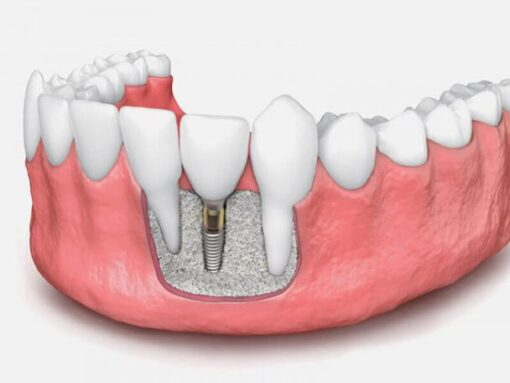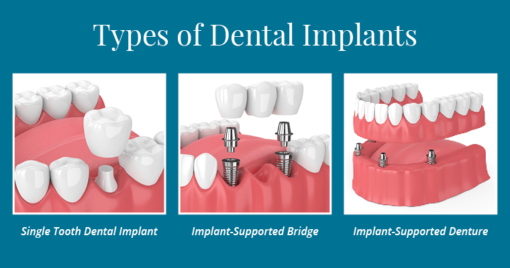The use of dental implants as a contemporary replacement for lost or damaged teeth is rising. This method of replacing a missing tooth is durable, safe, and there are several kinds of implants that may be used to replace a single lost tooth or numerous missing teeth. Endosteal and subperiosteal implants, both of which are surgically inserted into the jawbone, are the two most popular forms of implants. In order to support replacement teeth, dental implant is artificial tooth roots that are inserted into the jawbone. They may be used to bridge gaps in the mouth or to support dentures or other dental prosthetics.
Definition of Tooth Implants
Dental implants are often constructed of biocompatible materials like titanium, which enables the implant to permanently integrate into the jawbone. The implant is surgically inserted into the jawbone, where it is left for many months to heal and integrate with the bone. A replacement tooth or dental prosthesis is added to the implant after it has completely fused with the bone, creating a functional and natural-looking tooth replacement. In order to restore a smile and enhance oral health, implants are a popular and practical solution.

Most often, implants are used to replace teeth that have been lost as a result of an accident, illness, or aging naturally. The implantation of dental implants in the smile of someone who has lost all of their teeth due to trauma is a typical example of endosteal implants. In reconstructive scenarios, such as restoring missing teeth that have been destroyed by accident or illness, implants may also be utilized.
Types of Tooth Implants
A titanium post is inserted into the jawbone during the implant procedure behind the gum line. These are referred to as endosteal implants and are the most typical kind. In order to insert endosteal implants into the jawbone, a part of the surrounding bone must be removed. Once the implant is in place, some of the surrounding bone grows back to hide it. There are several varieties of implants available, each with unique benefits.

Endosteals made of titanium: They are surgically implanted into the jawbone and serve as the replacement tooth or teeth’s roots. In situations when there is enough jawbone to support the implant, endosteal implants are often employed. These are the most popular kind and involve inserting a titanium post straight into the jawbone.
Subperiosteal Implants: Implants that are subperiosteal are positioned above the jawbone but below the gum line. When there is not enough jawbone to support an endosteal implant, ssubperiostealimplants are employed. Compared to endosteal implants, they are less frequent. On the other hand, subperiosteal implants, which are positioned on top of the jawbone, are made of a metal frame that holds a false tooth.
More types of Dental Implants for damaged tooth:
Zygomatic Implants: These implants are utilized when an endosteal implant cannot be supported by the jawbone because of extensive bone loss in the upper jaw. Instead of the jawbone, the cheekbone is used to implant zygomatic implants.
All-on-4 Implants: With this method, a whole arch of replacement teeth is supported by four dental implants. In the jaw, the implants are deftly positioned for maximum stability and support. The most complicated form of dental implants, all-on-four implants, are often utilized to replace many teeth.
Mini Implants: They are positioned under the gum at the base of the teeth and are the tiniest implants currently available. These implants make it possible to replace either one tooth or a few teeth. The roots of the four teeth on each side are connected to these implants, which are inserted through the mouth into the bone above the jawbone.
Benefits of Tooth Implants
Specifically designed to replace missing teeth: Implants are designed to replace a specific tooth, so they are more likely to fit exactly where the tooth should be.
Long-lasting: Implants are a natural option, lasting a lifetime and not subject to diseases or physical damage.
Cost-effective: Implants are generally less expensive than dentures and bridges.
Minimal pain: They are minimally invasive, so they cause less pain than traditional dental procedures, such as tooth extractions.
No jaw surgery is required: Implants are placed with minimally invasive surgery and require no surgery for later removal.
Limited limitations: Implants can be used to replace a single tooth or multiple teeth, not just one tooth at a time.
No possible future dental issues: Implants are less likely to become infected or loosen than traditional dental options.
No need for braces: Implants can be used to rebuild teeth that have been damaged and worn down by braces.
Risks of Tooth Implants
Although implants are a fantastic choice for replacing teeth, there are certain hazards involved. Implants might result in severe problems, just like any other dental operation. For instance, wearing dentures that are too big or too loose might hurt your mouth. Pain, bruising, and damage may also result from implant wear if the jawbone is not sufficiently supporting the implant. Implants may pose a risk of significant infection, which can be fatal if they get dislodged or contaminated.
How to choose the right Dental Implant?
The kind of implant to utilize depends on a number of variables. Age, general health, and the kind of teeth being replaced are all taken into consideration. and the doctor. When deciding which implant type is ideal for your case, you may want to take into account the following factors: Why do people lose their teeth? What kind of teeth are there in the mouth? A What is the state of the person’s overall health? The teeth being replaced—how old are they? How is the individual’s financial situation? And what are the implant’s indications? What other options are there?
To get the answers to all of these queries, contact us at:
Conclusion
The decision to use teeth implants is a personal one. And implants can be a great solution for replacing missing teeth. But they are not suitable for everyone. As with any dental treatment, it is important to weigh the benefits and risks of implants against the potential benefits and risks of other treatment options before making a decision. You may want to consider talking to a dentist about the best option for your situation.
© All rights reserved by Royal Dental Implants Pvt Ltd
Issued in public interest






